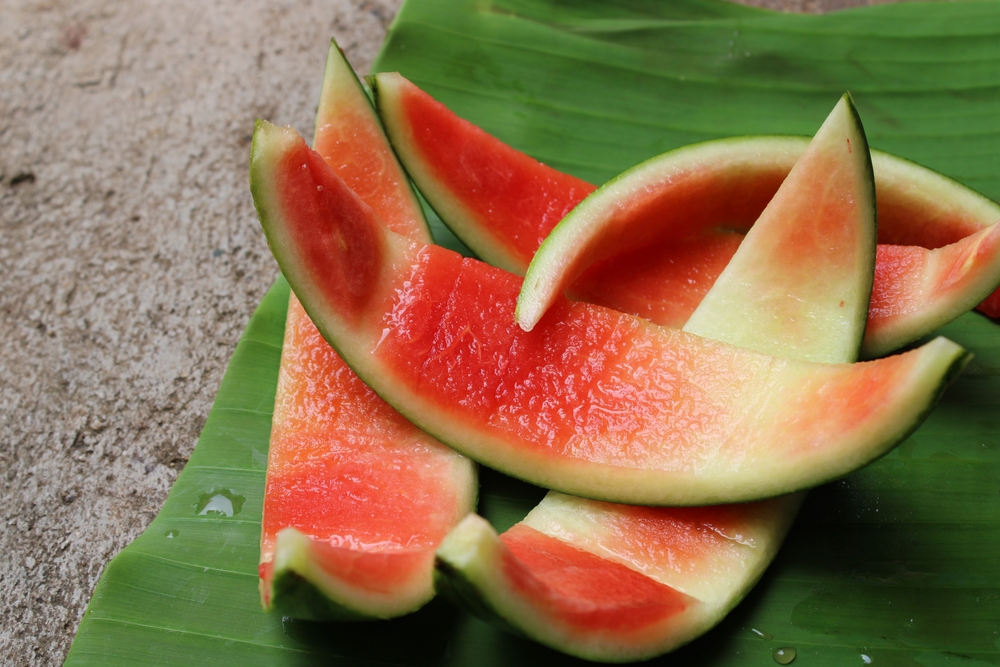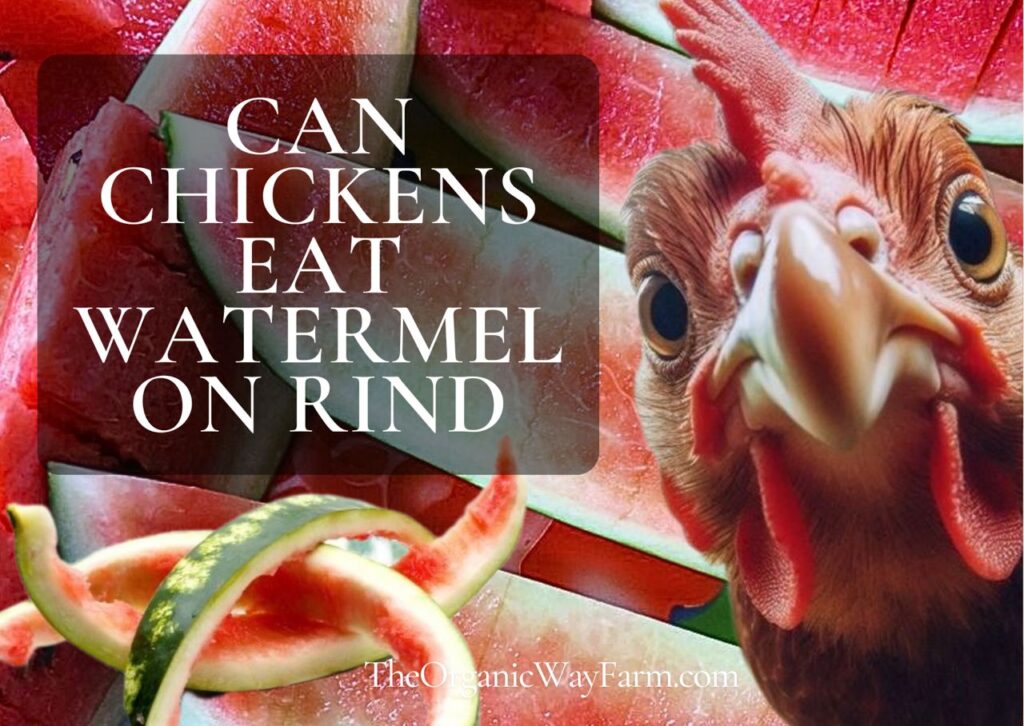If you happen to have some watermelon around, you might be asking yourself, “Can chickens eat watermelon rind?” You’re not alone in wondering about this! Many chicken owners are curious about what scraps they can share with their feathery friends.
The short answer is YES, chickens can eat watermelon rind! It is safe for them and can be a delicious addition to their diet. But how can we safely provide this to them? And how much should they actually eat? These are important questions we should address.
In this article, we’ll uncover all you need to know about feeding watermelon rind to chickens. Together, let’s explore the benefits, risks, best ways to serve it, and much more.
- Can Chickens Eat Watermelon Rind?
- How Much Watermelon Rind Can Chickens Eat?
- Best Way to Feed Watermelon Rind to Chickens
- Benefits of Feeding Watermelon Rind to Chickens
- Risks of Feeding Too Much Watermelon Rind to Chickens
- Substitutes for Watermelon Rind for Chickens
- Frequently Asked Questions
Can Chickens Eat Watermelon Rind?

Watermelon, including its rind, can be an exciting treat for our chickens. The rind is the green outer part of the watermelon that we often discard, but chickens enjoy it! Watermelon rind is not toxic for chickens and provides them with some interesting nutrients. We might wonder about how easily they can digest this part of the fruit. Generally, chickens can digest it without any problem if served correctly.
Chickens are omnivores, which means they enjoy a balanced diet of grains, seeds, and fruits. Watermelon rind fits well into their diet and can be a good source of hydration since it has a high water content. This can be especially helpful during hot summer months.
How Much Watermelon Rind Can Chickens Eat?
While chickens can eat watermelon rind, knowing how much they should have is important. Moderation is key here. Too much of any treat, including watermelon rind, can disrupt their normal diet and lead to digestive issues. Typically, a few pieces of watermelon rind a week should suffice as a treat.
We should aim for a serving size that’s manageable. Chickens have small beaks and their ability to eat is determined by what they can pick up and nibble on. Cutting the rind into smaller pieces helps them eat more comfortably and prevents choking. It is also a good idea to observe how they react to new foods. If they seem overly interested or excited, they might want more, but moderation is still important.
Monitoring how our chickens consume the rind is also critical. Some might take a while to warm up to it or may not show interest right away. Offering it alongside their regular feed can help them try it out.
Best Way to Feed Watermelon Rind to Chickens?
The way we present the watermelon rind to our chickens can make a big difference in how much they enjoy it. One suggestion is cutting the rind into small, bite-sized pieces. This makes it easier for them to grab and eat. It’s preferable to leave the flesh on for an added treat which makes the rind tastier and more appealing.
Another option is to place the rind on the ground or in their feeder for them to peck at. Chickens love to scratch and forage, and placing the rind in various spots allows them to engage in natural behaviors. This can make feeding time more fun for our feathered pals!
Some chicken owners have even experimented with freezing watermelon rind during the summer months. This not only cools the rind but can also provide a fun treat for the birds when they need to cool off. Just be sure to let it thaw a bit before offering it to avoid any risk of frostbite.
Benefits of Feeding Watermelon Rind to Chickens
Hydration
One of the major benefits of watermelon rind is hydration. Chickens can sometimes struggle with hydration, especially in hotter temperatures. Watermelon is made up of around 90 percent water, making the rind a juicy treat that supports hydration. When we offer watermelon rind, we help our chickens stay hydrated and healthy during the sweltering summer months. Proper hydration is essential for overall health and egg production.
Fiber
Watermelon rind can also provide chickens with fiber, which is important for digestion. Fiber helps in maintaining a healthy gut and promotes regular bowel movements. By offering watermelon rind, we contribute to their overall digestive health.
Vitamins and Minerals
The rind contains some beneficial vitamins and minerals that can support our chickens’ well-being. This includes vitamin A, which is essential for healthy vision, and vitamin C, which can support their immune system. These nutrients play crucial roles in keeping our chickens feeling their best, ready to run around and enjoy their day.
Mental Stimulation
Offering different foods, like watermelon rind, stimulates our chickens mentally and keeps them engaged. Pecking at the rind allows them to use natural foraging instincts, which is critical for their mental health. A happy chicken is often a healthy chicken!
Nutritional Breakdown of Watermelon Rind
Watermelon rind is low in calories and high in water, making it a great snack for chickens. It usually contains small amounts of various nutrients: vitamins A and C, magnesium, and potassium are common in this fruit. While they are not massive sources, every little bit helps!
Dangers of Feeding Too Many Water Melon Rind to Chickens
We should consider some potential risks when feeding watermelon rind to chickens. While it is generally safe, moderation is essential. If we give our chickens too much watermelon rind or any treat, it can lead to an unbalanced diet. Too many treats can cause them not to eat their main feed, which impacts their nutrition overall.
Another concern is the possibility of mold. If we offer watermelon rind that is spoiled or moldy, it could lead to health issues for our chickens. Always be sure to check for any signs of spoilage before sharing this tasty treat. Fresh is best when it comes to food for our chickens.
Some chickens may have sensitivities or allergies to certain foods. Watch how our flock reacts after trying watermelon rind. If there are any signs of distress or discomfort, we might want to stop offering it. Each chicken’s digestive system is unique, and it’s essential to cater to their individual needs.
Substitutes for Watermelon Rind for Chickens
If we’re looking for alternatives or substitutes for watermelon rind, there are plenty of other fruits that our chickens might enjoy. Chickens can safely eat apple cores, snap peas, and even carrots! Each of these options can also provide hydration and essential nutrients.
For times when watermelon is not available, consider giving chickens other fruits like berries or smaller pieces of melon. Each fruit has its unique benefits and can keep our chickens entertained and happy.
We can also switch things up with vegetables. Leaves from the garden or other green veggies like spinach or cabbage often find a big hit with chickens. Providing a variety of foods is a great way to keep their diet exciting and healthy.
Can Chickens Eat Watermelon Rind? Frequently Asked Questions
Is there any part of the watermelon that is harmful to chickens?
No, all parts of a watermelon are safe for chickens — including the flesh, seeds, and rind. However, the rind is tougher and less nutritious than the red part, so some chickens may not eat much of it. Always make sure the watermelon is fresh and free from mold, as spoiled fruit can upset their digestive system.
Can watermelon rind be given to baby chicks?
Yes, baby chicks can eat watermelon rind, but only in small amounts and finely chopped. Their beaks and digestive systems are still developing, so it’s best to grate or dice the rind into tiny pieces. Offer it as an occasional treat and continue feeding chick starter as their main diet.
How can I tell if my chickens like watermelon rind?
You’ll know your chickens like watermelon rind if they peck at it eagerly, scratch around it, or keep returning for more. If they ignore it or only nibble lightly, they might prefer the softer red flesh of the watermelon instead.
What other fruits are safe for chickens?
Many fruits are safe and healthy for chickens when fed in moderation. These include apples (without seeds), bananas, berries, grapes, melons, pears, peaches (without pits), and pumpkin or other squashes. Avoid citrus fruits and avocados, as these can cause digestive problems or be toxic to chickens.
Is too much watermelon rind bad for chickens?
Yes, too much watermelon rind can cause diarrhea or an upset stomach because watermelon contains a lot of water and little protein. Treat watermelon as an occasional snack rather than a main food source. A balanced chicken feed should still make up at least 90% of their diet.
Final Thoughts
Feeding watermelon rind to our chickens can be a fun and nutritious way to treat them. Remembering to offer it in moderation can ensure our flock remains healthy and happy. The benefits it provides, from hydration to mental stimulation, makes it a great addition to their diet. If you are curious about other fruit options, you can check out Can Chickens Eat Grapes? for more information!
In all, being mindful of what we feed our feathery friends ultimately leads to happy, healthy chickens that can produce delicious eggs for us to enjoy. So, let’s continue to explore ways to keep our birds thriving!






